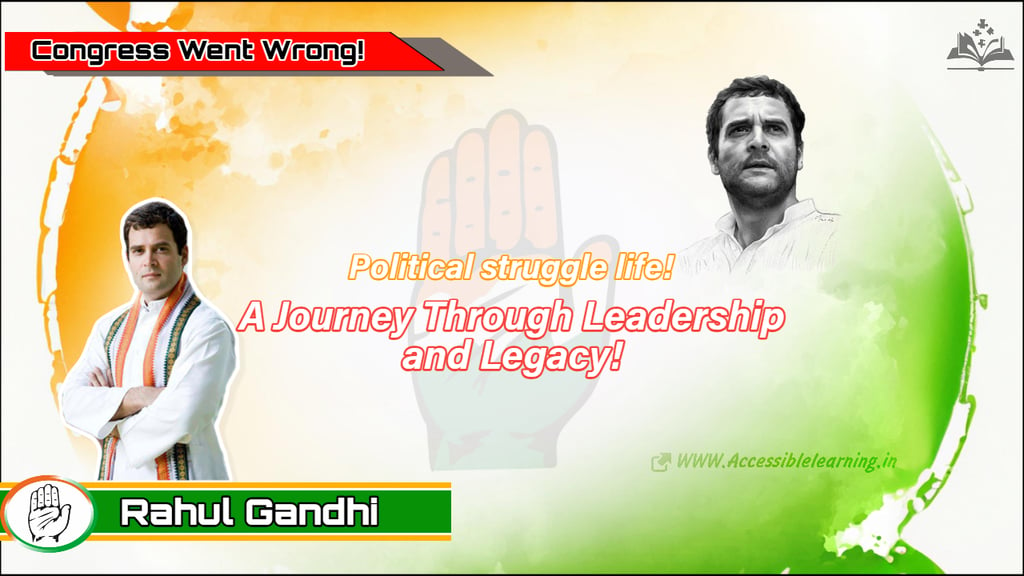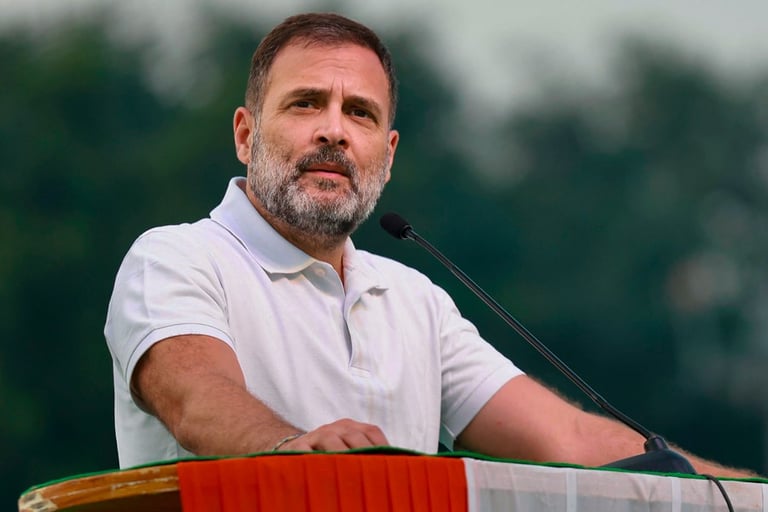
The Struggle of Rahul Gandhi: A Journey Through Leadership and Legacy!
Rahul Gandhi's political journey has been full of struggles, including leadership challenges, internal party feuds and electoral defeats. This article highlights where he and the Congress party went wrong, his leadership style, the party's resistance to change, and how he can rebuild his image and the party's future.
POLITICAL JOURNEYINCBIOGRAPHYSTORY/ENTERTAINMENTAWARE/VIGILANT
Sachin K Chaurasiya
9/13/20245 min read


Rahul Gandhi (राहुल गांधी), the scion of India's most iconic political family, has faced an uphill battle ever since he entered public life. His journey has involved extreme scrutiny, constant expectations, and an evolving political landscape that has constantly tested his leadership. But where exactly did things go wrong for Rahul Gandhi, and what was the role of the Congress party in this story? Let's take a closer look at this.
The Burden of Legacy: Where Rahul Gandhi Miscalculated!
Rahul Gandhi (राहुल गांधी) was born into the Nehru-Gandhi family (नेहरू-गांधी परिवार), a dynasty that has dominated Indian politics for decades. His family’s history, from Jawaharlal Nehru (जवाहरलाल नेहरू) to Indira Gandhi (इंदिरा गांधी) and Rajiv Gandhi (राजीव गांधी), casts a long shadow, and this has been both a blessing and a curse. Where Rahul Gandhi got it wrong is in underestimating the political change that occurred in India after the liberalization of the economy and the rise of a new kind of electorate. The "Nehruvian" era, characterized by mass adoration of a single party, had ended, and a more fragmented, regionalized India had emerged.
Despite these changing dynamics, Rahul initially leaned heavily on his family name. While it helped in his early political years, it quickly became a point of contention. The BJP's narrative of "dynasty politics" found resonance with an electorate looking for change. Rahul Gandhi was often portrayed as an entitled politician who had inherited his leadership position rather than earned it. His hesitation in countering this narrative only deepened the perception that he was not cut out for modern-day politics.


Lack of Consistent Leadership: Rahul’s Missed Opportunities
One key area where Rahul Gandhi faltered is his inconsistent approach to leadership. For many years, he seemed unsure about how much responsibility he wanted to take. He often spoke of democratizing the Congress party and bringing in young, dynamic talent, but his own actions were contrary to this approach. For instance, after the Congress’ historic defeat in the 2014 general election, Rahul Gandhi seemed apathetic, often withdrawing from the public eye. When he did speak, his message lacked clarity and conviction. His resignation as Congress president after the 2019 general election, while seen by some as a noble act of accountability, also signaled a lack of determination to step up and lead in difficult times. Rahul seemed to want to lead in good times but stepped aside when things got difficult, leaving his party in disarray.
The Congress Party’s Own Failings: A System Resistant to Change
Rahul Gandhi's leadership struggle cannot be denied, but the Congress party is equally culpable. The party, once representing a broad spectrum of Indian society, has become too reliant on the charisma of the Gandhi family rather than adapting to the changing political environment. Many senior Congress leaders opposed the internal reforms proposed by Rahul Gandhi. His call for grassroots democracy within the party—allowing young leaders to emerge—faced resistance from a leadership steeped in old ways.
The Congress' failure to develop strong second-line leadership has been one of its biggest weaknesses. Rahul Gandhi was often left alone in the political spotlight, with no capable team to support him. When key leaders like Jyotiraditya Scindia, who could have strengthened the party's image, moved to the BJP, it became clear that the Congress failed to nurture and retain its talent.
This factionalism and internal strife have weakened the Congress from within, making it difficult for any leader, including Rahul Gandhi, to bring about meaningful change. The party's decision to rely on the Nehru-Gandhi name rather than focusing on a collective strategy left it vulnerable to aggressive political campaigns by the BJP.
Where Rahul Gandhi Could Have Done Better: Leadership and Messaging!
One key area where Rahul Gandhi could improve is his messaging. Despite being a well-educated and thoughtful man, his communication with voters was often muddled or ill-timed. His speeches, while full of intent, often lacked the emotional connection or thrust required in Indian politics. His rivals, particularly Prime Minister Narendra Modi Ji, were adept at simplifying their message and connecting with the masses. Modi’s eloquence, combined with his ability to tap into nationalist sentiments, created an emotional bond with voters that Rahul Gandhi failed to establish. In contrast, Rahul’s focus on broader issues such as unemployment, farmer distress, and economic inequality, though important, was often lost in translation. His failure to address local or immediate concerns in a coherent manner alienated him from the grassroots, the very people he sought to advance.


The 2019 Defeat: Personal and Political Setbacks!
The 2019 general election was a watershed moment for Rahul Gandhi. After a relatively strong showing in several state elections before the national polls, many expected the Congress to give the BJP a tough fight. Rahul Gandhi’s “Chowkidar Chor Hai (चौकीदार चोर है)” campaign, which targeted Modi over corruption and nepotism, was initially seen as a masterstroke, but it backfired. Modi skillfully turned the narrative around, using it to portray himself as a victim of elitist politics. Rahul Gandhi’s loss to his family bastion Amethi in the same election was a deeply personal blow. It was symbolic of how disconnected the Congress had become from its traditional vote base. The defeat was also a reflection of Rahul’s inability to unite the Congress around a coherent message and campaign.
Renewed Efforts: The Bharat Jodo Yatra!
In 2022, Rahul Gandhi launched the Bharat Jodo Yatra, a nationwide campaign to reconnect with the masses and address national issues such as unemployment, economic inequality and religious polarisation. This marks a significant shift in his approach, moving away from mere electoral politics to focus on building grassroots connections. The yatra was seen as an attempt to reinvigorate Congress and challenge the BJP's dominance by directly connecting with people at the grassroots level.
The initiative showcased a more determined Rahul Gandhi, willing to walk alongside ordinary citizens, listen to their concerns, and present himself as a leader with a vision for India's future. While it remains to be seen how effective the campaign will be, it represents Rahul's attempt to redefine his role in Indian politics.
A Way Forward for Rahul and the Congress!
Rahul Gandhi needs to focus on three things to succeed in the future: consistent leadership, clear messaging, and party reform. The Congress party must end its dependence on the Gandhi family and build a strong organizational structure that can function independently of its legacy. On the other hand, Rahul Gandhi needs to adopt a more assertive leadership style and communicate his vision more effectively. The Congress must also regain its ideological clarity. For too long, the party has tried to position itself as everything to everyone, leading to confusion about who it really represents. If Rahul Gandhi can champion a consistent and progressive ideology that addresses the concerns of modern India, there is still hope for a comeback for both him and the Congress.
The story of Rahul Gandhi is not just one of personal struggle but also of the party's decline. While Rahul Gandhi failed to provide consistent leadership, the Congress party too failed to evolve with the times. While his journey has been filled with mistakes and challenges, Rahul Gandhi's determination to rebuild his image and the Congress' future shows that the struggle is far from over.
If Rahul Gandhi can learn from past mistakes and the Congress can overcome its inertia, there remains a path to relevance for both. However, this will require a genuine commitment to reform, grassroots engagement and unwavering focus on the needs of the Indian people.
Subscribe to our newsletter
All © Copyright reserved by Accessible-Learning
| Terms & Conditions
Knowledge is power. Learn with Us. 📚


